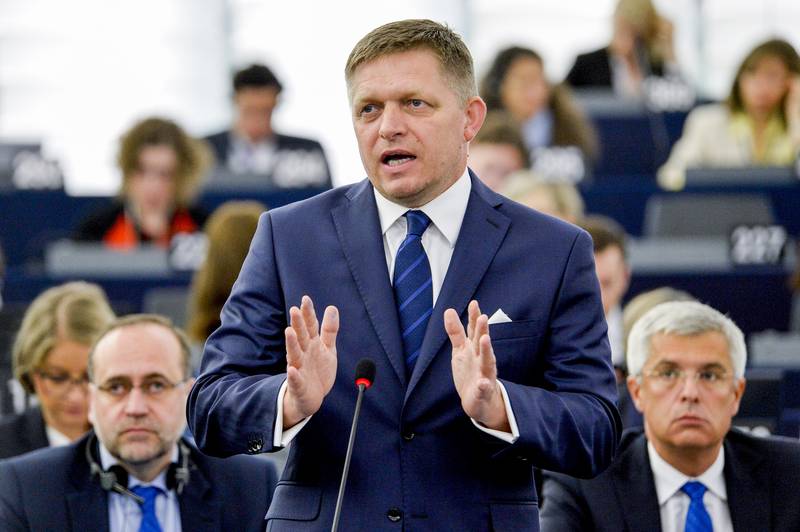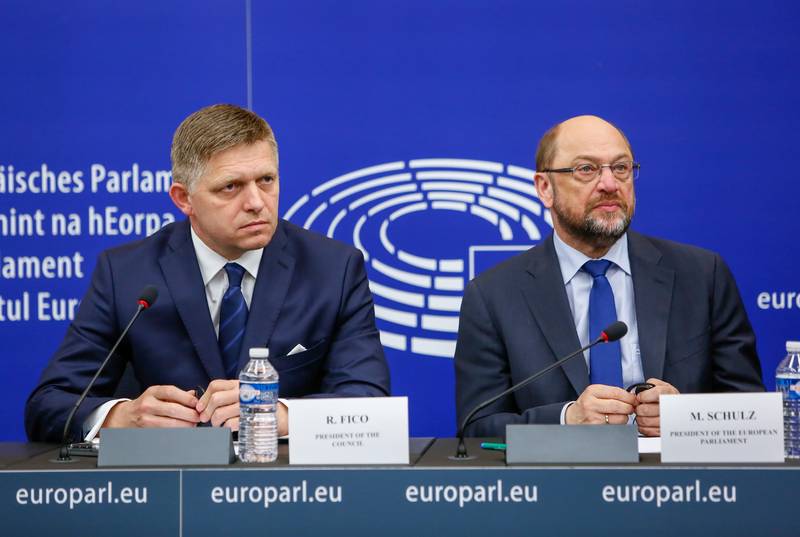Brussels, Do We Know Each Other?
Adelina Marini, July 8, 2016
 Can you imagine that the prime minister of a member state from the innermost levels of the EU – Schengen and the euro area – knows nothing of the European Parliament? Moreover, we are talking about a country, which has just taken over the rotating presidency of the Council, meaning dozens of negotiations with the European Parliament regarding current drafting of new European legislation. After the blow that eurosceptics took because of mass lies and manipulations during the Brexit, campaign, euroscepticism took another hit on July 6th, when Slovak Prime Minister Robert Fico admitted most sincerely in the European Parliament that he actually did not know how this key European institution works. This happened after a two-hour debate, dedicated on the presentation of the priorities of the Slovak 6-month rotating presidency. If the prime minister does not know, it is understandable why citizens on a large scale do not know.
Can you imagine that the prime minister of a member state from the innermost levels of the EU – Schengen and the euro area – knows nothing of the European Parliament? Moreover, we are talking about a country, which has just taken over the rotating presidency of the Council, meaning dozens of negotiations with the European Parliament regarding current drafting of new European legislation. After the blow that eurosceptics took because of mass lies and manipulations during the Brexit, campaign, euroscepticism took another hit on July 6th, when Slovak Prime Minister Robert Fico admitted most sincerely in the European Parliament that he actually did not know how this key European institution works. This happened after a two-hour debate, dedicated on the presentation of the priorities of the Slovak 6-month rotating presidency. If the prime minister does not know, it is understandable why citizens on a large scale do not know.
It is a tradition for the state and government leaders of member states to present their priorities when it is their turn to head the presidency of the Council of the EU. It is Slovakia’s first turn and, just as it happened with Hungary, the debate was focused mainly on Slovak euroscepticism, the refusal to implement European legislation for the redistribution of refugees, cases of human rights violations at Slovak borders, and, last but not least, the PM’s statement of several months ago that Muslims have no place in Slovakia. Nothing from the Slovak PM’s presentation in Strasbourg came as a surprise. As was expected he focused on migration as a key priority. He was cautious, for he knew there was a tough interview by MEPs coming his way.
He was interviewed and straight-on criticised on his position about Muslims and refugees, being completely unaware that belonging to a certain political group in the European Parliament does not mean at all that one needs to share the same opinion. Criticism came from members of one and the same political group, but from different nationalities. He was criticised both from “his own” (the group of Socialists and Democrats), and from outsiders. Members of the most eurosceptic right-wing groups were also critical of his refugee policy (mainly from Italy), but there was criticism coming from the far-left wing as well. The entire diversity of the European Parliament unfolded before him, representing the diversity in the entire European Union – not all far-right wing are eurosceptics, neither are all, who are moderately-left wing, Keynesian. Everything is relative in Strasbourg. No one expected him to make such a confession.
“I will start by saying something, which, maybe, has never been said by a PM. I want to admit that my years in Slovakia on the political scene and the years when I headed the government of Slovakia I really haven't paid enough attention to your work. And I find today that I don't know so much about the EP. If I were to know I could understand better the diversity and the wealth of thoughts, ideas in this plenary. Equally, I would welcome if you had more information about the individual MS. Therefore I would like to offer cooperation and that is to arrange more contacts during our presidency so that we avoid misunderstandings and help mutual understanding”, stated Mr Fico, facing the almost empty plenary hall in Strasbourg.
Later, during a press-conference with the participation of the boss of the European Parliament Martin Schulz (Socialists and Democrats, Germany), Robert Fico was subjected to questions from European media on separate European dossiers, which he also realised he was not prepared enough for and this pulled another confession out of him – that he is a boy from a Slovak village, who now has to deal with the problems of Europe. This is indisputably a very big lesson to those member states, where euroscepticism is thriving mainly on the lack of enough information about how the EU works and what is the role of member states in it. Robert Fico’s confession is obviously a huge failure for him, but also for Slovak MEPs, who are not very active in the European Parliament, with the exception of the most famous name among them – foreign affairs committee member and former foreign minister Eduard Kukan (EPP), who is very active regarding EU enlargement. This is also a failure of the national government, which does not include the Slovak public in discussions at the European level.
Fico’s confession is truly odd, having in mind that in euro area countries (Slovakia has been euro area member since 2009) media generally deal mainly with the EU and problems of the euro area. It is obvious that this is not a problem just for Slovakia and its closed national politics, but of European institutions too, which could invite more often national representatives for hearings in the European Parliament or for bilateral meetings.
In the end of the day, Fico’s ignorance turned into not just a plus for him, but a positive for the Visegrad group, which is seen more and more in the EU as a source of Euroscepticism of Brexit proportions. From the entire debate, led with surprisingly low MEP interest, it became clear that we do not know each other very well. Fico, and some other MEPs as well, like Kateřina Konečná (far left-wing, Czech Republic) ascertained that the Visegrad group is not an enemy of the EU. Quite the contrary. According to the Slovak PM, the Visegrad Four (V4) is a unique regional formation, uniting countries, which have passed through the same transformation in a very short time – transformation, which has taken other European states centuries.  This is why, these four states – Poland, Slovakia, The Czech Republic, and Hungary – share common experience and values. They are all pro-European, he assured. He also quoted sociological surveys, showing that over 60% of citizens approve of the EU and see no alternative to it.
This is why, these four states – Poland, Slovakia, The Czech Republic, and Hungary – share common experience and values. They are all pro-European, he assured. He also quoted sociological surveys, showing that over 60% of citizens approve of the EU and see no alternative to it.
The prime minister reminded that new member states from Eastern Europe, among which Bulgaria and Romania, were extremely patient and have made many compromises because of their wish to join the EU. He expressed expectation that older member states are also patient and have compassion. It did not become clear for what. Maybe, because there is still a lack of trust between the East and the West within the EU. Migration policy is one of the battlefields, where this lack shows the most. Trust was lacking in many of the MEPs, who interviewed him about the “gap” between the Visegrad group and the rest in the EU. Among them were MEPs both from older member states, like Rebecca Harms (Greens/EFA Germany), and the newest member like Dubravka Šuica (EPP, Croatia).
Attacks at Robert Fico were mild, not sharp like at the time of the Hungarian presidency at the start of 2011. According to Françoise Grossetête (EPP, France), it is not enough to be European just in Brussels and Strasbourg. You have to be one in Bratislava. Gérard Deprez (ALDE, Belgium) stated straight forward that he does not trust people, who speak European in Brussels and play the nationalist string in their own country. Ana Gomes (Portugal) from the same political family as Fico’s party – Socialists and Democrats – directly shared concerns that keeping in mind the statement about having no place for Muslims in Slovakia, the Slovak presidency will only sharpen current problems, instead of solving them.
First European Commission Vice-President Frans Timmermans was rather meek. He pointed out that European law needs to be followed by all member states. He did remind, however, that Slovakia has gone a long way since the time when relationships with minorities in the country was very tense and when individual parties never even talked to each other, while now they rule together. In his opinion, Slovakia is a good European story. Of the same opinion was another member of the European Commission – Slovak Commissioner Maroš Šefčovič, who is responsible for the energy union. He pointed out that ever since the fall of the Iron Curtain, Slovakia has been nothing but success.
The fact that at the end of the debate Fico extended an open hand to MEPs and showed initiative for more contacts is a good beginning. A Czech MEP from the Liberals group proposed another great idea, which, alas, is not within the powers of the rotating presidency. Pavel Telička requested that discussions in the European Council also be made public, as is done with some particular discussions in the Council of Ministers. The European Council, however, has a permanent president – at the moment the post is taken by former Polish PM Donald Tusk (EPP). The Council, which is presided on a rotating principle, often has public sessions, when the ministers’ deliberations on key European dossiers can be heard.
It remains for Fico in the next 6 months to persuade the European community that the Visegrad group is not the new eurosceptic mine on the European field, but simply still needs trust and getting to know it. Perhaps the Slovak presidency could fill the void of knowledge of both sides in the EU, which could be a step towards fighting euroscepticism.
Translated by Stanimir Stoev
 Federica Mogherini | © Council of the EU
Federica Mogherini | © Council of the EU | © Council of the EU
| © Council of the EU Luis De Guindos | © Council of the EU
Luis De Guindos | © Council of the EU